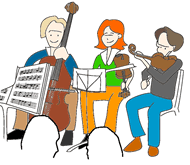
  |
|  The
following table lists a number of staff development ideas.
These are divided into four categories. The "elementary"
type of in-service training often does not cater for a whole-school
approach or for an in-depth study of school-specific issues.
However these are the most common staff development activities
and must not be overlooked or underestimated. "Research-based"
activities are more sophisticated and call for a serious commitment
on the part of teachers. "Hands-on" experiences
need to be institutionalised to be successful as the teachers
would need to act in a supportive environment. "Advanced"
staff development initiatives are intended to bring about
change in various ways. They require a collective effort
and can be successful in schools where a strong sense of community
is felt. The
following table lists a number of staff development ideas.
These are divided into four categories. The "elementary"
type of in-service training often does not cater for a whole-school
approach or for an in-depth study of school-specific issues.
However these are the most common staff development activities
and must not be overlooked or underestimated. "Research-based"
activities are more sophisticated and call for a serious commitment
on the part of teachers. "Hands-on" experiences
need to be institutionalised to be successful as the teachers
would need to act in a supportive environment. "Advanced"
staff development initiatives are intended to bring about
change in various ways. They require a collective effort
and can be successful in schools where a strong sense of community
is felt.
Which staff development activities do you carry out in your
school?
A. Elementary:
- attend regular in-service and other coursesorganised
by external agencies
- invite guest speakers on a one-off basis tothe
schoolØ participate in short in-house focusedcourses
run by outside staff
- organise induction for student-teachersand novice teachers
- take personal initiative to keep
up to date with developments in language education
- invite a senior teacher as an observer to
give"objective" feedback
- participate in community eveningsespecially concerning languages and
cultures
- other?
B. Research: based (observation and action
research)
- "being a pupil for a day" and attending alllessons
to understand better the languageissues
from a pupil"s point of view
- visit other schools, or participate inexchanges,
to witness alternative ways of teaching
- mutual classroom observation by
teachersand/or video discussions
- school-based workshops
- carry out surveys to collect
data prior to implementing policy
- staff evaluate and
discuss following the implementation
of a innovation
- collect a list of
references (e.g. books,videos, CD-Roms, web-sites) that tacklelanguage
issues
- other?
C. Hands on Experience: (job enrichment)
- participate in co-operative teaching
- experience new tasks e.g. time-tabling,
chairing committees, organiseexaminations
(rotate tasks among teachers)
- participate in work in progress
such as needs analysis; an
appraisal scheme; the development of
policies specific to issueslike discipline, high achievers, children
with special needs,
school environment, autonomous learning,
language teaching, etc.
- explore staff attitudes towards
educational issues, and specifically language attitudes
- actively involv ing parents
in educational tasks
- teachers work together across thecurriculum
- teachers organise extra-curricular events
together (e.g. a language soiree)
- other?
D Advanced:
- organize a working party to improveparticular
curricular areas
- work in partnership with other stakeholders(e.g.
parents) and act as
learners in theprocess
- participate in sessions to cultivate
positiveenergy on a human level, e.g. by focusing on positive past events,
team building exercises to tackle issues like mistrust
and conflict, role playing to improve body
language, etc
- other?
|
 |
|